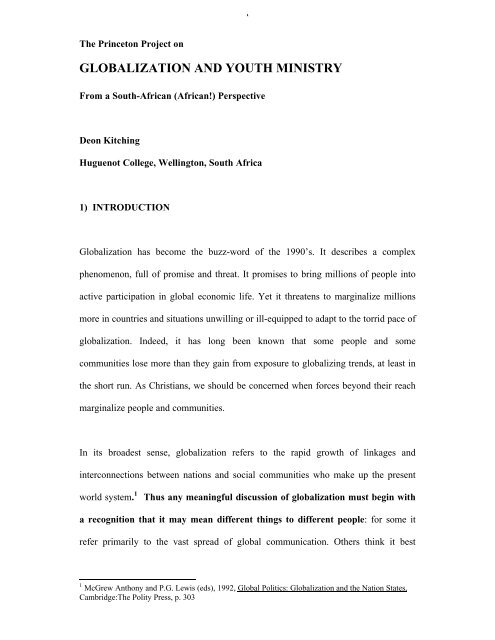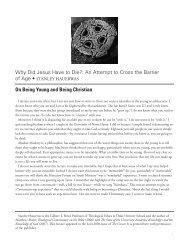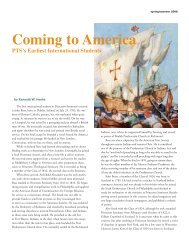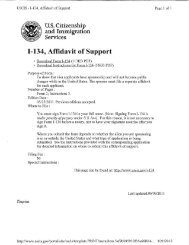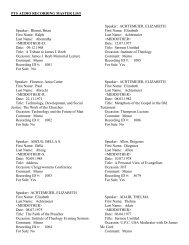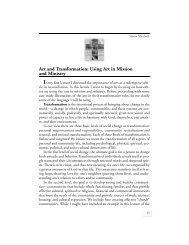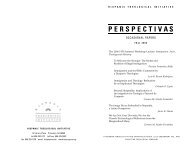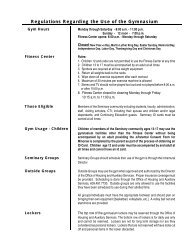globalization and youth ministry - Princeton Theological Seminary
globalization and youth ministry - Princeton Theological Seminary
globalization and youth ministry - Princeton Theological Seminary
- No tags were found...
You also want an ePaper? Increase the reach of your titles
YUMPU automatically turns print PDFs into web optimized ePapers that Google loves.
1The <strong>Princeton</strong> Project onGLOBALIZATION AND YOUTH MINISTRYFrom a South-African (African!) PerspectiveDeon KitchingHuguenot College, Wellington, South Africa1) INTRODUCTIONGlobalization has become the buzz-word of the 1990’s. It describes a complexphenomenon, full of promise <strong>and</strong> threat. It promises to bring millions of people intoactive participation in global economic life. Yet it threatens to marginalize millionsmore in countries <strong>and</strong> situations unwilling or ill-equipped to adapt to the torrid pace of<strong>globalization</strong>. Indeed, it has long been known that some people <strong>and</strong> somecommunities lose more than they gain from exposure to globalizing trends, at least inthe short run. As Christians, we should be concerned when forces beyond their reachmarginalize people <strong>and</strong> communities.In its broadest sense, <strong>globalization</strong> refers to the rapid growth of linkages <strong>and</strong>interconnections between nations <strong>and</strong> social communities who make up the presentworld system. 1Thus any meaningful discussion of <strong>globalization</strong> must begin witha recognition that it may mean different things to different people: for some itrefer primarily to the vast spread of global communication. Others think it best1 McGrew Anthony <strong>and</strong> P.G. Lewis (eds), 1992, Global Politics: Globalization <strong>and</strong> the Nation States,Cambridge:The Polity Press, p. 303
2conveys the homogenization of consumer cultures. 2For still others, it is mostly a wayof drawing attention to the emerging consciousness of our mutual dependence on thelife support system of a small planet. Many others believe it is best reserved todescribe economic <strong>globalization</strong> – the erasing of economic borders to allow the freeflow of goods <strong>and</strong> money. And still others wonder if it might best be used toacknowledge the spread of global civil society – a force that questions other forms of<strong>globalization</strong>, especially economic <strong>globalization</strong>.Leading theorists of <strong>globalization</strong> define it first as the process of turning the "worldinto a single place" 3It is important to note that both an objective <strong>and</strong> a subjectivepole are involved in this process. Globalization "refers both to the compression of theworld <strong>and</strong> to the intensification of consciousness of the world as a whole." 42) GLOBALIZATION: WHAT DOES IT MEAN FOR THESOUTH AFRICAN CONTEXT?2.1) Issues in the current debateIt is important for the rest of the paper to look briefly at a few trends in the debateover the impact <strong>and</strong> role of <strong>globalization</strong> in South Africa. As already stated, theimpact of <strong>globalization</strong> has many "faces" <strong>and</strong> it is my duty to come forward with aSouth African perspective. One can summarize the viewpoints as follows:2 For a very interesting discussion of consumerism, please read the article by Daniel R. White <strong>and</strong> GertHellerick: “Nietzsche at the Mall: Deconstructing the Consumer”, athttp://home.pix.za/gc/gc12/genx/p2007.htm3 Robertson, Rol<strong>and</strong>, 1992, Golobalization: Social Theory <strong>and</strong> Global Culture, London: Sage, p.84 Ibid.
3• The economic crisis of the 1970’s opened the way for faster globalintegration• The world is currently going through an unstable transition to anew global order in which national economies are more tightlyintegrated• The computer revolution made globalisation easier• English became the “official” language of all the communicationsystems• National governments are losing their power• The world is also fragmenting• Globalization is concentrated within the richer economies• The poor economies, many of which are in Africa, are marginalised• Ethnic <strong>and</strong> political conflicts are leading to disintegration• Global co-operation between trade unions <strong>and</strong> other grassrootsorganisations has become more necessaryFuelled by the 1994 "African Renaissance" speech of our new President, ThabuMbeki it is my conviction that leading South African companies, politicians <strong>and</strong>economic leaders host a more positive perception than the rest of the so-called thirdworld countries about <strong>globalization</strong>. The government believe, that through the processof the "awakening of Africa", South Africa <strong>and</strong> the rest of Africa can become a majorforce to be reckon with. The influence of "the African Renaissance" is also a topic forlater reflection. It is however very important to look at the impact of the globaleconomy on South Africa.
42.2) South Africa in the Global Economy.“South Africa in the Global Economy. Underst<strong>and</strong>ing the challenges. Workingtowards alternatives” 5is one of the textbooks most South African universities usein their Economy classes. The title of this book reflects the current underlyingexpectations which people nurture when thinking about the role of <strong>globalization</strong> in aSouth African context. Coming from an era of harsh racial discrimination people arestill(?) optimistic about “challenges” <strong>and</strong> “working towards alternatives”. In thisTrade Union Research Project they define <strong>globalization</strong> as:“The process whereby the economic, political, social, <strong>and</strong> cultural linksbetween different countries, industries, companies, organisations <strong>and</strong>individuals of the world are increasing, is referred to as globalisation. It isa process which has been happening gradually for a long time, but whichhas developed rapidly since the 1970’s.” 62.3) "Globalization means action, not words…"Reported Madeleine Wackernagel in the "Mail <strong>and</strong> Guardian" online newspaper onNovember 21, 1997. We’ve been here before, she argued: globalisation is simply anew term for an old concept - the free flow of capital <strong>and</strong> goods between countries.World War I laid the last period of laissez-faire to rest; 50 years of significant crossbordermovements of labour, money <strong>and</strong> produce were soon replaced by fierceprotectionism.5 Isaacs, Shafika <strong>and</strong> staff of the Trade Union Research Project, 1997, South Africa in the ClobalEconomy. Underst<strong>and</strong>ing the challenges. Working towards alternatives. Durban: T.U.R.P.6 Ibid. p.21
5There followed the Great Depression, exacerbated by high tariff barriers <strong>and</strong> capitalcontrols. But post-World War II, the big economies placed their faith in breakingdown those barriers to boost growth. The General Agreement on Tariffs <strong>and</strong> Tradewas set up, <strong>and</strong> with it the first of many deals to cut tariffs world-wide. At the sametime, countries gradually abolished exchange controls, freeing up the flow of capital.The first time round, it was the drop in transport costs that oiled the wheels of freetrade; this time, it is technology. The steady decline in the costs of computing <strong>and</strong>communication have made world markets easier to tap; at the same time, the benefitsof liberalisation have come to outweigh the dangers.The trend to greater integration is clear: from 1980 to 1996, world output has grown ata rate of 3; trade at 6. At the same time, foreign direct investment flows haveexp<strong>and</strong>ed by about 9, <strong>and</strong> trading in shares, by 25. Few economies can afford toignore this phenomenon, <strong>and</strong> South Africa is no exception. Years of isolation <strong>and</strong>protectionism have left the country out of touch with global st<strong>and</strong>ards - of service,productivity <strong>and</strong> quality. As a result, the competition is stealing a march on us.The time for talking is over, was the message of the Globalisation - South Africaconference. Speaker after speaker emphasised the need for action, not analysis.The scene was set by Finance Minister, Trevor Manuel: "…globalisation has thegovernment’s blessing." Indeed, it has always been crucial to policy. South Africamust move away from the capital-intensive, jobless growth of the past, <strong>and</strong> internationalisationwas an important part of this process. Turning a sow’s ear into a silkpurse is no easy matter, Manuel opined, but South Africa has made significant stridesin the global arena.
6Business leaders were of a different opinion: companies still have a long way to gobefore catching up with the rest of the world, as does the labour market. Wage riseshave outrun productivity increases; quality of goods <strong>and</strong> services is poor, <strong>and</strong> tariffbarriers are dropping too fast for many companies to keep up. As a result, we’re leftwith a situation of ongoing retrenchment <strong>and</strong> slow economic growth. Labour was notrepresented at the conference, which is a pity considering they came in for the mostcriticism: a 40- hour working week was unacceptable, as was persistently poorproductivity at relatively (compared with India <strong>and</strong> Mexico, for instance) high wages.Only by working towards a common goal of improved flexibility <strong>and</strong> skillsenhancement would the present impasse be overcome. Until then, South Africa wouldremain a marginal player in the world economy. Foreign companies in search of alow-cost manufacturing base cannot afford to relocate here <strong>and</strong> our exports are moreexpensive than those produced in Latin America <strong>and</strong> south-east Asia. Management,too, came under fire for being complacent: 40 years of protection have left manycompanies ill-equipped to cope with the rapid pace of change now being forced onthem.But those other favourite Nineties terms - downsizing, rightsizing <strong>and</strong> restructuring -are not the solution; instead, companies need to develop new strategies, inconsultation with labour, to carry them forward into the 21st century. A company -<strong>and</strong> a country - is only as good as its people. The alternative is to be left behind as theglobalisation train proceeds apace. 77 The Mail <strong>and</strong> Guardian Copyright © 1997 Mail <strong>and</strong> Guardian. Distributed via Africa NewsOnline(www.africanews.org).
72.4) Conclusion: Globalization <strong>and</strong> South African transformationIt is clear that South African economy <strong>and</strong> politics are mostly positive towardsglobalisation. It is seen both as a boon <strong>and</strong> a burden for South African development.The balance of the effects of globalisation on the country's development dependsstrongly on how public <strong>and</strong> private institutions engage this process proactively <strong>and</strong>purposely. Given South Africa's past isolation <strong>and</strong> its current rush to attract foreigninvestment <strong>and</strong> maintain international respectability, the political, economic, <strong>and</strong>cultural impacts of globalisation on South African society must be examinedcritically. This could be the role of the church.3) SOUTH AFRICAN CHURCHES AND GLOBALIZATION3.1) The Church <strong>and</strong> economic <strong>globalization</strong>Most churches from a Protestant background in South Africa will agree with thepaper: “The Globalization of Economic Life—Challenges to the Church” by DrGordon Douglass. 8He mentioned the following <strong>globalization</strong> trends:• Rapid Growth of International Trade• Even Faster Growth of Foreign Direct Investment• The Explosion of Private Financial Movements across BordersHe sees the following consequences of <strong>globalization</strong>:• Heightened Inequality• Conflicts over Social Priorities• Fragmented Safety Nets8 This paper is part of the document: Processus Confessionis-Process of Recognition, Education,Confession <strong>and</strong> Action Regarding Economic Injustice <strong>and</strong> Ecological Destruction—Background Papersno 1, published by the World Alliance of Reformed Churches, 1998. www.warc.ch
8Douglass several times cites the document “Hope for a Global Future”, 9 a documentapproved by the 208 th General Assembly (1996) Presbyterian Church (U.S.A.). Thisdocument forms the basis for several discussions in South Africa on the role ofthe church in a global society. The following statements by the General Assemblyhave found their way into the South African debate:• The satisfaction of basic needs is indispensable for hum<strong>and</strong>evelopment. Sufficiency for all requires that poverty be eradicated<strong>and</strong> that the affluent live more frugally… 10• Human rights are essential to the expression of human dignity <strong>and</strong>are fundamental to the quest for human development…• Public participation of all persons in the decisions that affect theirlives <strong>and</strong> well-being is a fundamental right… 11• Authentic human development does not come in a single, fixedpattern. There are differences in cultural <strong>and</strong> worship practices thatexpress the same universal values of justice, integrity of the person,solidarity, <strong>and</strong> sustainability…• The repayment of debts <strong>and</strong> interest at the expense of the basics oflife raises serious questions of justice. The burden of debts must beshared equitably in ways that reduce poverty, protect theenvironment, <strong>and</strong> avoid perverse incentives in the future…9 Hope For A Global Future: Toward Just And Sustainable Human Development <strong>and</strong> Study Guide,1996, Developed by the Advisory Committee on Social Witness Policy, Kentucky: The Office of theGeneral Assembly.10 One of the best books in this regard is the book by Goudzwaard, Bob <strong>and</strong> De Lange, Harry, 1995,Beyond Poverty <strong>and</strong> Affluence. Toward an Economy of Care. With Twelve-Step Program forEconomic Recovery, Gr<strong>and</strong> Rapids: Eerdmans Publishing House11 The book by Rieger, Joerg, (ed.), 1998, Liberating the Future. God, Mammon <strong>and</strong> Theology,Minneapolis: Fortress Press is noteworthy. The reflections directly address the new situation, especiallythe emergence of a global market economy, shifting structures of oppression, <strong>and</strong> the advent ofmulticulturalism <strong>and</strong> postmodernism.
9• The purpose of development assistance is to equip people <strong>and</strong>communities through financial <strong>and</strong> technical means to implementtheir own plans for just <strong>and</strong> sustainable development3.2) Globalization: WCC Assembly participants describedivine <strong>and</strong> diabolic aspects 12The World Council of Churches' 8 th Assembly at the Harare, Zimbabwe, meeting,December 1998) approved a statement on <strong>globalization</strong>, <strong>and</strong> many speakers, includingthe WCC's moderator <strong>and</strong> general secretary, made reference to it in plenary speeches.But what does it mean? What are its implications for us <strong>and</strong> for our churches?Interviews with Assembly participants revealed a wide range of definitions - somepointing to <strong>globalization</strong>'s potential to lift up, others to its capacity to oppress."There are a number of interpretations," began Phambili ka Ntloko of the Church ofGod <strong>and</strong> Saints in Christ, South Africa, whose <strong>ministry</strong> is with industrial workers."Globalization is a strategy of international capital to create more markets for itself<strong>and</strong> to restructure the relationships of production. "All companies are being pushed tobe internationally competitive, so they 'downsize,'" laying off workers, he said."Similarly, when state-owned companies such as transport <strong>and</strong> telecommunicationsare privatized, they fire workers on the basis that the new owner will be 'efficient.'Workers work longer hours at a time capital needs them <strong>and</strong> when not needed theydon't work. People, when they lose their job, sense that their dignity as humanbeings is challenged," he said. "Some go to the extent of hiding the fact that they areno longer working. They go out carrying their bags as usual <strong>and</strong> come back in theevening, because not working hurts their dignity. The church must restore that12 www.ncccusa.org/news/news116.html
10dignity. The church must be an anchor of hope in their hour of darkness." Mr.Ntloko's International Committee for Industrial Mission offers such an anchor. It runsjob creation <strong>and</strong> employment programs "so people can live on their own, start abusiness <strong>and</strong> hope in life again."Rev. Kenichi Otsu, General Secretary, National Council of Churches of Japan, saidthat while most discussion of <strong>globalization</strong> centers on the economic aspects, "we wantpeople to be aware of the military aspect." For example, Japan - which according toits Constitution has no Army but does have a civil defense force - <strong>and</strong> the UnitedStates have signed a new security agreement that commits Japan to support U.S.military action. Japan must open space for military exercises <strong>and</strong> Japan's privatesector - transportation, public facilities - also must cooperate. "The U.S. already usesour base in Okinawa," Mr. Otsu said. "Before it was under the United Nations'framework. Now it's a bilateral agreement."Abigail Damasane, Family of God Church, Zimbabwe, spoke of the difficulties oftaking advantage of the benefits of <strong>globalization</strong>. She said, "We have beenindependent for only 18 years. Some of these international terms are 'new fromthe box' for us. Globally, we are trying to walk before we have crawled, in orderto catch up <strong>and</strong> to be on the global wavelength."A Harare taxi driver served as a case in point. Since his father <strong>and</strong> older brother died,he has become responsible for supporting his mother <strong>and</strong> two younger brothers, alongwith his wife <strong>and</strong> their two children. "I don't know how we are surviving," he said,
11describing his struggle to earn the about U.S.$240 a month needed. A U.S.$1,200roundtrip air ticket to the United States is virtually unthinkable, he said.As for <strong>globalization</strong>, "it's just a word," he said. "I'm not feeling any advantage." For<strong>globalization</strong> to work, he speculated, it would take one currency, one economy, onepresident. Noting that it now costs about 63 Zimbabwean dollars to purchase oneBritish Pound, he said, "I don't think the British want to give up 62/63rds of thevalue of their currency."The Rev. Lala Biasima, a pastor of the Church of Christ in Congo <strong>and</strong> associategeneral secretary of the CCC's Department of Women <strong>and</strong> the Family, expressedstronger misgivings. She said, "We feel very uneasy when we hear about<strong>globalization</strong>. Part of the world is very powerful <strong>and</strong> the rest weak. The strong will dowhat they want regardless of the effect on the poor." The challenge, she said, is to"make sure everyone benefits in some way, <strong>and</strong> to redistribute the resources ratherthan widen the gap between rich <strong>and</strong> poor."Assembly participants who were interviewed agreed that <strong>globalization</strong> is here to stay,<strong>and</strong> that the church "must fight against the bad side of <strong>globalization</strong>," said BishopHans Gerny of the Old Catholic Church in Switzerl<strong>and</strong>. "We should not be tooadapted to society." "We can look at it <strong>and</strong> see how big financial powers can help theweaker ones," said the Rev. Oka Fau'olo, Congregational Christian Church in Samoa."They want to make money - (that's alright) as long as they don't take too much <strong>and</strong> aslong as we have good mutual underst<strong>and</strong>ing <strong>and</strong> negotiation."
12Globalization also has good sides, several people said. "Would the WCC have met inHarare in 1948?" Bishop Gerny asked. "People can have more contact, can help inareas where they could not help before. Christ says, 'Go <strong>and</strong> make disciples of allnations.' It's a challenge to bring all nations the Gospel of liberation. We can use newtools like the Internet to share the Gospel in word <strong>and</strong> deed, using the new tools thatlink us globally."Anglican Archbishop Walter Makhulu from Botswana, in a debt hearing,distinguished between "human" <strong>and</strong> "divine" <strong>globalization</strong>. He said the former "insistson privatization, currency devaluation, reduction of government subsidies <strong>and</strong> tradederegulation. We must agitate for the cancellation of debt," he said. "Then wewill rediscover the divine <strong>globalization</strong> of community, generosity, sharing <strong>and</strong>mutual caring."Rev. Dr. Kwasi Aboagye-Mensah, International Fellowship of Evangelical MissionTheologians, who will serve as General Secretary of the Christian Council of Ghanabeginning January 1999, took a positive, "visioning" approach, along the lines ofdivine <strong>globalization</strong>. "My underst<strong>and</strong>ing is a linking of people of the world together inkind of a global village where we will become very much interconnected both infulfillment of our needs as well as sharing of the world's resources," he said. "As aChristian I see <strong>globalization</strong> as one of the many things in the Scriptures whereGod is seeking to bring all nations together in Christ through the enablingpresence of the Holy Spirit."
13"Through technology I'm linked to what's happening far <strong>and</strong> near," Rev. Aboagye-Mensah said. "I don't even have to go out of my house to buy stamps. In a visionaryform it will bring all nations together <strong>and</strong> have one language in a metaphorical sense.So there's not the fear of you destroying me but the anticipation of how you can makeme whole. So that the meeting is much more positive."Archbishop Desmond Tutu: When there are millions starving, I think that theremust be something fundamentally wrong. I do not buy this whole business aboutthe market, because the market isn't something that has got a total autonomy outthere. The market is controlled <strong>and</strong> run by human beings. As South Africansseek a just balance between the market <strong>and</strong> morality, other Africans struggleagainst multi-national corporations-- another key force in the process of<strong>globalization</strong>.In the previous section I discussed <strong>globalization</strong> from a South African perspective <strong>and</strong>the voices from different churches as a reaction to this phenomenon. It is indeed clearthat there are no hard <strong>and</strong> fast rules in the "game" at the moment. Africa is lurking…The rest of the world is lurking…4) POSTMODERNISM, GLOBALIZATION AND AFRICAThe whole issue of postmodernism <strong>and</strong> its influence on Africa <strong>and</strong> South-Africa callsfor an extra paper. In the next paragraph I tried to link the four basic pillars ofpostmodernism, as distinguished by Walter Truett Anderson, with the socialphenomenon of consumerism. I believe the influence of postmodernism is felt veryexplicitly in this field by South African <strong>youth</strong>. I am also convinced that anyone doing
14research in this regard would find many gaps in the field of empirical knowledgeavailable.4.1) FrameworkWalter Truett Anderson provides a useful framework for postmodern thought in theintroduction to his book, by giving four "corners of the postmodern world", which herefers to as the four main dimensions of postmodernism. 13 I find his approach helpfulin the context of this study• Self-concept: Postmodernism encourages people to think ofthemselves as "made" rather than "found". In pre-modern timesidentity was founded on a shared sense of rootedness in the past. Inmodernity it was found in progress, an ideological hope for thefuture. Postmodernity has lost the certainty of its hope for thefuture <strong>and</strong> has failed to rediscover any coherent sense of rootednessin the past• Moral <strong>and</strong> ethical discourse: In line with being "made" peoplerather "found" people, we need to make our own morality based ondialogue <strong>and</strong> choice, rather than simply accept the "found" moralityof our society, fixed by social role, religious heritage <strong>and</strong> tradition• Art <strong>and</strong> culture: Most of life can be reduced to style, <strong>and</strong> istherefore open to personal taste <strong>and</strong> choice. We do not haveanything that dominates, but rather an endless stream ofimprovisation, variation, eclecticism <strong>and</strong> change. Within culture,13 Anderson, W.T.(ed.), 1996, The Fontana Post-Modernism Reader. Abridged edition. London:Fontana, p.10
15people borrow <strong>and</strong> combine from a multitude of traditions, rituals<strong>and</strong> myths• Globalization: The global culture is mobile <strong>and</strong> interactive, withrapid information exchange <strong>and</strong> continuous global news reporting,<strong>and</strong> affects everyone in the world. …No longer can one groupclaim ascendancy over another. No longer can one group claim tohave a complete hold on the truth. But there is a growing feelingthat we are in an age of transition. We haven't got a grasp on hownew technology will affect us, or how this <strong>globalization</strong> will end.We don't know how to control it or where it is heading.4.2) The Effects of Postmodernism on Today's South African Youth 14The most significant dimension of the shift from modernity to post-modernity forAfrican <strong>youth</strong> is the move from a culture in which personal identity <strong>and</strong> socialintegration were found through production <strong>and</strong> the work-place--rootedness in the past-- (<strong>and</strong> thus making a positive contribution to a foreseeable world) to a culture basedon consumption, the market <strong>and</strong> personal choice, now. Even sociologists who resistthe term "post-modern" describe the new shape of society as being centred onconsumerism. Consumerism is the social water in which we all swim. Young peoplecannot avoid it. They need to underst<strong>and</strong> it so that they can swim in it <strong>and</strong> not drownin polluted waters."Consumerism culture also acts as an anaesthetic. It numbs its followers, hiding thepoor <strong>and</strong> disadvantaged, <strong>and</strong> creating what one financial expert describes as 'two-tier14 See in this regard the contribution by Greame Codrington athttp://home.pix.za/gc/gc12/genx/thesis/ch2.htm
16world, I'm alright, scenario.' For those who are poor it offers a view of the good lifewhich is economically out of reach" 15As society has changed, so the traditional links between family, school <strong>and</strong> work havebeen weakened. The sense of risk in making choices about work, home <strong>and</strong> sexualpartners is one of the primary factors contributing to the sense that young peopletoday are growing up in a different world to that experienced by previous generations,because they are subject to uncertainties which were not part of day to day life forprevious generations. The effect of this is an increasing isolation from adult worlds.5) SOUTH AFRICA: CHILDREN IN BETWEEN THE TIMES"South Africa's Youth: Facing the Challenges" by Shun Govender is a veryimportant text to take into account when one discuss the issue of <strong>globalization</strong> <strong>and</strong><strong>youth</strong> <strong>ministry</strong> in South Africa. 16Govender refers to South African Youth as "children in between the times". 17The reality of living in between the times impacts especially on the children ofthe world. "Our children live in a time when the past is uninspiring <strong>and</strong> thefuture holds no promise. If this is so, then it means that we have placed anunbearable load upon the shoulders of our children; the unbearable load beingthat they live in a world of shattered utopias…Young people in the wealthy Westare becoming more <strong>and</strong> more conservative <strong>and</strong> uncaring of the world, while15 Cray, Graham, 1998, Postmodern Culture <strong>and</strong> Youth Discipleship-Commitment or Looking Cool?,Cambridge:Grove Books Limited16 Malan, Charles <strong>and</strong> contributors Marais, Hendrik, Olivier, Johan, Riordan, Rory <strong>and</strong> Van ZylSlabbert, F., South Africa's Youth: Facing the Challenges, athttp://www.sub.su.se/sam/nyri/nyrin/19972/safrica.htm
17young people in the rest of the poor world are becoming rebels without acause" 185.1) Crisis as Context (Govender):"It is very necessary for us to identify <strong>and</strong> describe the nature of the global situation ofcrisis, for this is the context in which the new South Africa is gaining its freedom, <strong>and</strong>in which it has to solve its problems." 19 The following five areas are a very "crisp"description of the South African context in which we have to do <strong>youth</strong> <strong>ministry</strong> at theend of the 20 th century.• The Logic is Missing• Very Little Time Left• Human Community is Fast Collapsing• Is There Still a Heaven Above?• What about Hope against Hope? 206) THE CHALLENGES FACING PRACTICAL THEOLOGYAND YOUTH MINISTRY (a few "l<strong>and</strong>marks" in the mist)Friedrich Schweitzer stated: "The main task of Christian education <strong>and</strong> <strong>youth</strong> <strong>ministry</strong>in a globalizing world consists in bringing global issues as the challenges in front of17 Govender, Shun, 1995, Life in Between the Times: The South African Renaissance, in Villa-Vicencio, C <strong>and</strong> Niehaus, C, 1995, Many Cultures, One Nation, A Festschrift for Beyers Naude, CapeTown: Human & Rousseau, p. 14018 Govender, Shun, 1995, Life in Between the Times: The South African Renaissance, in Villa-Vicencio, C <strong>and</strong> Niehaus, C, 1995, Many Cultures, One Nation, A Festschrift for Beyers Naude, CapeTown: Human & Rousseau, p. 14019 ibid.,p.14220 ibid., p.142-143
18us <strong>and</strong> <strong>globalization</strong> as the impact from behind our backs together. We will not beable to bear our Christian values <strong>and</strong> ideals for global life if we do not also take intoaccount the more ambivalent impact of <strong>globalization</strong>. It is also true that we will not bein a position to adequately address the disruptive impact that <strong>globalization</strong> exerts on<strong>youth</strong> if we do not rely on our Christian <strong>and</strong> ethical visions for a global future ofpeace <strong>and</strong> justice." 21 He mentioned four perspectives that play a major role in thistask. I would suggest the following from a South African perspective.• To fascilitate/assist young persons in the formation of a self-identity--especially to face the impact of the high unemployment rate"The one consequence of <strong>globalization</strong> is that in our quest to become accepted withinthe global arena, our differences become more evident. We are constantly beingconfronted with our own individuality <strong>and</strong> uniqueness as we endeavour to re-think<strong>and</strong> re-make ourselves in order to become accepted on a global level. A system has tobe developed that enhances our similarities whilst at the same time learning from <strong>and</strong>incorporating our differences. In order to develop these alternative viewpoints <strong>and</strong>strategies it might be necessary to start again - perhaps by taking a different route, aroad less travelled, but still heading towards the same global destination" 22A paradox of the interplay between <strong>globalization</strong> <strong>and</strong> postmodernity is that the searchfor, or construction of, identity that is perhaps its greatest concern, turns out to have ahidden agenda; the avoidance of being answerable to anyone apart from myself. The21 Schweitzer, Friedrich, 1999, Global Issues Facing Youth in the Postmodern Church, in The 1998<strong>Princeton</strong> Lectures on Youth, Church <strong>and</strong> Culture, <strong>Princeton</strong>: <strong>Princeton</strong> <strong>Theological</strong> <strong>Seminary</strong>.22 A viewpoint on "identity <strong>and</strong> <strong>globalization</strong>" formulated by a student in Advanced PublicManagement, Monica Beek, in a paper: Globalized Public Management - The Road Less Travelled,1998, The University of Stellenbosch.
19hub of postmodern life-strategy is not identity building but avoidance of fixation."Keep the options open!"• The role of Art <strong>and</strong> Culture in WorshipInter-cultural worship <strong>and</strong> contact place a high emphasis on symbolism, art <strong>and</strong>culture. We live in a country with tremendous riches in this regard, but due toWestern suspicion towards African traditional religions, we did not explore thepossibilities.• The development of Christian leadership style(s?) for a postmodern <strong>and</strong>globalized societyBergquist (1993:101) compares the postmodern leader with an orchestra conductorwho may not be able to play all the instruments, but know how to focus orchestramembers' skills on a common objective. It is also accepted that orchestra membersthemselves should take responsibility for providing direction to colleagues. The postmodernleader is also like a butterfly that knows that his/her lifespan is limited.He/she must "ride" the wind <strong>and</strong> change direction with "it" 23• To explore the fundamental theological meaning of HOPE in a crisis context<strong>and</strong> "in between times".The socio-economic context in which South-Africans live, drifts between hope <strong>and</strong>despair. There are strong voices proclaiming the dawning of a new age while thereality proves the opposite. The high unemployment rate leads to despair <strong>and</strong> the useof violence as a means of satisfying this "consumer" needs of young people.
207) CONCLUSIONS AND "GAPS"• There is no literature available (readily) on the issue of <strong>globalization</strong> <strong>and</strong> <strong>youth</strong><strong>ministry</strong> in South Africa (in the world?)• The subject-matter however is well <strong>and</strong> alive <strong>and</strong> there is a lot of research to bedone.• Black <strong>youth</strong> of South Africa are now, after the demolishing of apartheid, for thefirst time facing the challenges of <strong>globalization</strong>, postmodernism <strong>and</strong> consumerismto their full consequences.• South African research do not take the needs of the different cultural groups intoconsideration. We are "very poor" concerning research results that, withoutdiscrimination, distinguished between the needs of all the young people of SouthAfrica.9) BIBLIOGRAPHYRelevant South African Studies on Globalization.(Information obtained from Human Sciences Research Council)CSD
21• A TEMPORALITY-PEDAGOGICAL ANALYSIS AND EVALUATION OFTHE PHENOMENON OF GLOBALIZATION. Van Niekerk, E.J., UNISA, D EdDepartment of History of Education, 1993• NON-FARM RURAL EMPLOYMENT AND GLOBALIZATION IN THEOVERBERG REGION OF THE WESTERN CAPE, SOUTH AFRICA:OPPORTUNITIES AND CONSTRAINTS. Erasmus, Z.E., University of CapeTown, Ph.D, Department of Sociology, 1995• STANDARD ADVERTISING AS PART OF MULTINATIONALCORPORATIONS' GLOBALIZATION STRATEGY. Pelser, T.G.,Potchefstroom University for Christian Higher Education. Masters in Commerce .Department of Economics, 1996• WOMEN AND GLOBALIZATION. Macqoene, A. (International LabourResource <strong>and</strong> Information Group), 1996.• ORGANISED LABOUR AND GLOBALIZATION : A CASE STUDY OFDAVID AND GOLIATH. Gostner, K., University of the Witwatersr<strong>and</strong>, MADepartment of Sociology• A METABLETIC EXEMPLARY INVESTIGATION INTO THEGLOBALIZATION PHENOMENON AND THE IMPLICATIONS THEREOFFOR EDUCATION AND TRAINING. Van Niekerk, M.E., University of SouthAfrica. Master of Education. Department of History of Education, 1996.• JOB CREATION, LABOUR STANDARDS AND GLOBALIZATION.Paphne, J., National Labor <strong>and</strong> Economic Development Institute, Sociology, 1997• GLOBALISATION AND CIVIL SOCIETY IN CONTEMPORARY SOUTHAFRICA. HLOPE, D., University of Natal . Master of Arts. Department ofPolitics 1997
22• THE GLOBAL AND LOCAL: STUDYING GLOBALIZATION IN THENORTHERN PROVINCE. De Kock, P. M., University of the North, Departmentof Political Science 1998• EN ROUTE TO THE COMPETITION STATE? THE SOUTH AFRCANPOLICY, ELITE AND GLOBALIZATION. Nel, P. R., University ofStellenbosch, Department of Political Science, 1998• COMPETENCIES REQUIRED TO MEET THE DEMANDS OFGLOBALIZATION. Da Silva, R. M., University of the Witwatersr<strong>and</strong>,. Mastersin Business Administration, Department of Business Administration, 1998• GLOBALISATION AND ITS IMPLICATIONS FOR SOUTH AFRICA:SOURCE OF SUSTAINABLE HUMAN DEVELOPMENT OR SOURCE OFPOVERTY? Biyela, N. B., University of Durban-Westville, Master of Arts,Department of Sociology, 1998• THE INFLUENCE OF GLOBALIZATION ON LABOUR SUBCONTRACTINGIN THE SOUTH AFRICAN MANUFACTURING INDUSTRY: A CASESTUDY OF THE AUTOMOBILE INDUSTRY. Kubela, M. L., R<strong>and</strong> AfrikaansUniversity, Master of Arts, Department of Sociology, 1998• THE EFFECTS OF GLOBALIZATION ON INDUSTRIAL RELATIONS INTHE RSA.Vettori, M., University of South Africa, LLD, Department ofMercantile Law, 1998• THE IMPACT OF GLOBALIZATION ON THE EMPLOYMENT LEVELS INTHE POST APARTHEID ERA IN SOUTH AFRICA. Pillay, D. University ofDurban-Westville, Master of Social Science, Department of Sociology, 1998
23• THE IMPACT OF GLOBALIZATION OF INTENATIONALCOMMUNICATION MANAGEMENT. Kern, S., R<strong>and</strong> Afrikaans University,Master of Arts, Department of Communication, 1998Relevant BOOKS/ PAPERS/ARTICLES published in SA• CHANGE AND SOUTH AFRICAN EXTERNAL RELATIONS edited byCarlsnaes,Walter <strong>and</strong> Muller.• PARTICIPATORY MANAGEMENT AND THE RDP ( reconsturuction <strong>and</strong>development program) by Liebenberg, Sybert <strong>and</strong> Stewart• PUBLIC RESOURCE MANAGEMENT by Schwella E, Burger J, Fox W, &Muller J, J.• SOUTH AFRICA IN THE GLOBAL ECONOMY. UNDERSTANDING THECHALLENGES. WORKING TOWARDS ALTERNATIVES.edited by Isaacs S. Trade Union Research Project. University of Natal. 1997• MANY CULTURES, ONE NATION, Festschrift for Beyers Naude, edited byVilla-Vicencio, C & Niehaus, C.BOOKS/ ARTICLES/PAPERS published elsewhere but relevant to South Africancontext• Duchrow, Ulrich, ALTERNATIVES TO GLOBAL CAPITALISM, 1995
24• Goudzwaard Bob & de Lange Harry, BEYOND POVERTY AND AFFLUENCE,Toward an economy of care, 1995• Korten, David, C., WHEN CORPORATIONS RULE THE WORLD,1995• Kung, Hans & Kuschel, Karl-Josef (Editors), A GLOBAL ETHIC, Thedeclaration of the Parliament of the Worlds Religions, 1993• Raiser, Konrad, TO BE THE CHURCH, Challenges <strong>and</strong> hopes for a newmillenium, 1997• HOPE FOR A GLOBAL FUTURE: Toward Just <strong>and</strong> Sustainable HumanDevelopment, Study <strong>and</strong> action guide published by the General Assembly of thePresbyterian church ( USA)• Balleis, S.J. ESAP ( Economic Structural Adjusment Programme) & Theology1992, Zimbabwe________________________________________________________


